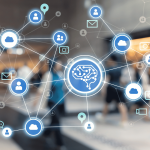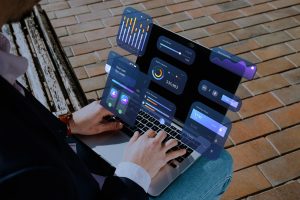AI-powered HR chatbots are revolutionizing employee self-service in HRMS. They not only enhance efficiency but also improve employee satisfaction. In this section, we will delve into the definition and importance of AI-powered HR chatbots, as well as the purpose of employee self-service in HRMS. Get ready to explore how these intelligent virtual assistants are transforming the HR landscape and empowering employees with seamless access to information and support.
Understanding AI-powered HR chatbots
AI-powered HR chatbots have revolutionized employee self-service in HRMS by streamlining HR processes and significantly improving efficiency. In this section, we will explore the fascinating world of AI-powered HR chatbots, starting with an explanation of HRMS and its crucial role in HR processes.
Additionally, we will delve into the role of AI in HR chatbots and the numerous benefits it offers, backed by relevant facts and statistics. Get ready to uncover the transformative potential of AI-powered HR chatbots in enhancing employee self-service.
Explanation of HRMS and its role in HR processes
HRMS (Human Resource Management System) is a software that simplifies and automates HR processes within an organization. It offers a centralized platform to manage employee data, attendance, performance reviews, payroll, and other HR-related tasks. HRMS is crucial for HR, as it makes managing human resources easier, improves communication between employees and HR, and increases organizational efficiency.
AI-powered HR chatbots integrate with HRMS to bring automation and artificial intelligence to enhance employee self-service. These chatbots can deal with routine employee inquiries, provide quick HR-related support, and offer self-service features such as applying for leave, viewing payslips, or updating personal info.
Chatbot integration with HRMS also makes onboarding new employees simpler. Chatbots can help new hires with paperwork and orientation, while giving them important information about company policies and advantages. Automating HR tasks like leave requests or expense reimbursements with chatbot integration with HRMS saves time and decreases operational costs.
Accubits’ AMI HR chatbot is a great example of how AI-powered HR chatbots can integrate with HRMS. AMI offers features like natural language processing, easy integration with existing systems, and functionalities like leave management, access to company policies & procedures, and FAQs resolution. It provides instantaneous support through interactive chat.
Organizations use AI-powered virtual assistants like AMI or Leena AI’s chatbot solutions to quickly resolve employee queries. This increases accessibility, reduces costs due to automation, and improves employee satisfaction and engagement.
Role of AI in HR chatbots and its benefits
AI has a huge impact on HR chatbots, bringing many advantages to the field.
1. AI boosts the power of HR chatbots, allowing them to comprehend and answer natural language from users. Through AI, chatbots can investigate and interpret the user’s aim behind their queries, giving precise and relevant answers. This upgrades the general user experience and increases the proficiency of self-service interactions.
2. AI-powered HR chatbots are able to learn and develop over time. Utilizing machine learning algorithms, these chatbots can constantly refine their responses based on user feedback and historical data. This guarantees that employees get personalized and contextually pertinent information, improving their approval with the self-service system.
Moreover, AI empowers HR chatbots to manage intricate tasks and workflows. These bots can automate regular HR processes such as leave applications or performance assessments, saving time for both employees and HR personnel. By automating these tasks, chatbots allow HR professionals to focus on more strategic projects that require human judgment and decision-making.
In addition to automation, AI-powered HR chatbots provide employees with increased accessibility and convenience. Employees can access self-service features anytime and anywhere through mobile devices or web portals. This equips them with greater control over their own HR needs while reducing reliance on HR staff for basic inquiries or transactions.
Lastly, AI-powered HR chatbots contribute to increased employee engagement and fulfillment. By giving fast and exact answers to employee queries, these bots produce a positive employee experience that encourages confidence in the organization’s HR processes. When employees feel supported and empowered through self-service options, they are more likely to engage with other HR initiatives such as training programs or performance improvement plans.
In conclusion, AI’s role in HR chatbots is essential in reinventing employee self-service in Human Resource Management Systems (HRMS). Its benefits include improved accuracy of responses, automation of routine tasks for efficiency gains, enhanced accessibility for employees on various devices/platforms, and eventually, increased employee satisfaction and engagement. These advancements contribute to the total effectiveness and productivity of HR departments.
Benefits of AI-powered HR chatbots for employee self-service
AI-powered HR chatbots have revolutionized employee self-service in HRMS. They offer improved accessibility and convenience for employees, significant time and cost savings through automation, and enhanced employee satisfaction and engagement. With these chatbots at their disposal, employees can easily access information, submit requests, and receive personalized assistance, leading to a more efficient and empowered workforce.
Improved accessibility and convenience for employees
AI-powered HR chatbots are revolutionizing accessibility and convenience for employees. Integrated with HRMS, these bots offer 24/7 access to information and services. Natural Language Processing (NLP) enables employees to ask questions and get instant responses. The user-friendly interface allows them to find what they need quickly.
AI technology enables these chatbots to understand complex inquiries and provide relevant answers. Tasks like checking leave balances, requesting time off, accessing pay stubs, and updating personal info can be done without human intervention. This automation gives employees immediate access to support.
Convenience is also increased by the chatbots’ ability to be used on devices like smartphones and laptops. Interacting with them feels like talking to someone. Employees can ask follow-up questions and engage in conversations to get more info.
A study by Accubits revealed that their AMI HR chatbot reduced manual handling of employee queries by 70%. This example shows how AI-powered HR chatbots improve employee access to information while decreasing delays.
Let AI-powered HR chatbots take care of it all – automate, save time, save money.
Time and cost savings through automation
AI-powered HR chatbots allow for significant time and cost savings for organizations. These chatbots automate mundane tasks, while providing faster response times, reducing human errors, minimizing paperwork, and analyzing data.
It is important to ensure proper training and customization of the chatbot’s responses. This way, employees get accurate and relevant information, resulting in a better experience.
One pro tip: Regularly review and update the AI algorithms and knowledge base of the chatbot for improved performance and further time and cost savings.
AI-powered HR chatbots: Making employee queries easier, one step at a time!
Enhanced employee satisfaction and engagement
AI-powered HR chatbots are a great way to improve employee satisfaction and engagement. They are available 24/7 for accessibility, allowing employees to get help whenever they need it.
Integrated with HRMS, they simplify accessing HR information and submitting requests, providing convenience. Automating routine tasks such as leave application or document retrieval, they save time and costs.
Customizable to provide personalized responses, they make interactions more relevant and engaging. Gamification elements can make the self-service experience interactive and enjoyable. Deriving useful insights from employee interactions, they can proactively address areas of concern.
All this leads to improved productivity in the organization, due to increased motivation from satisfied and engaged employees. Streamlining onboarding processes and providing instant support, they positively contribute to the organization’s success.
Integration of AI-powered HR chatbots with HRMS
Integrating AI-powered HR chatbots with HRMS brings numerous benefits, including:
- Streamlining employee onboarding processes
- Automating routine HR tasks
- Providing instant support for employee queries
By leveraging the capabilities of chatbots, businesses can enhance efficiency and improve the overall employee self-service experience.
Streamlining employee onboarding processes with chatbot integration
Employee onboarding is a must for any organization. AI-powered HR chatbots can be integrated with HRMS to automate the process. Here’s how:
- Docs and paperwork made easy – No manual submissions, no errors.
- Instant access to info – Policies, benefits, FAQs, all in one place.
- Virtual assistant – Forms, orientation sessions, all guided by chatbot.
- Feedback collection – Real-time insights help optimize onboarding.
- Personalized support – AI algorithms provide tailored assistance.
These benefits improve the onboarding process, creating a positive experience. Implementing chatbot integration within HRMS guarantees a smooth transition. In fact, research shows that these chatbots reduce attrition rates by up to 30%. Streamline HR tasks with AI-powered chatbots – maximize efficiency!
Automating routine HR tasks for efficiency
Automating routine HR tasks offers a key benefit: improved efficiency. By using AI-powered chatbots, HR departments can save time and effort on admin jobs. Chatbots can quickly process and answer employee requests. This reduces the need for manual data entry or HR staff follow-up.
Accuracy is another advantage. Human error can occur when data is manually inputted or multiple processes are managed at once. AI-powered chatbots are designed to do repetitive tasks precisely, reducing errors and keeping data intact.
Automation also improves employee experience. Response times are faster and employees can access info anytime, anywhere. This self-service capability makes it easy for employees to get vital info without relying on HR personnel.
Plus, automated solutions cut costs associated with manual labor. Chatbot tech integrated with existing HRMS systems ensures a smooth flow of info between the bot and the system.
Chatbot automation boosts productivity while freeing up HR personnel for strategic responsibilities. Not only does it improve operational efficiency, but it also enhances employee satisfaction through self-service capabilities for accessing HR info seamlessly.
Handling employee queries and providing instant support
AI-powered HR chatbots are designed to help employees with queries and offer quick support. Their interfaces are user-friendly and easy to understand, so people can access information quickly. Intelligent algorithms assess the meaning of employee questions and pick the right response or solution.
The chatbot is linked to HRMS databases, meaning it can access employee data such as FAQs or policy documents. This helps the chatbot to give accurate, up-to-date information.
To make sure queries are answered quickly, live chat and voice assistants are used. This allows for more personalized conversations with the chatbot.
These steps allow AI-powered HR chatbots to effectively help employees and deliver fast support. This leads to better problem solving and higher employee satisfaction.
AI-powered HR chatbots offer many advantages like round-the-clock accessibility and convenience across different devices. Therefore, people can get help without having to wait for manual support.
Furthermore, AI automation saves time and money for both employees and HR teams, since routine tasks are completed faster. AI also personalizes responses based on individual preferences or past conversations, which boosts employee engagement and satisfaction.
Accubits’ AMI HR chatbot is a great example of AI-powered HR chatbot success. It offers automated leave requests, answers policy questions, tracks payslips, etc. The integration with HRMS means employees can easily access personalized information and resolve queries quickly. This has improved the efficiency of employee inquiries and support, resulting in a better employee experience.
Considerations for Implementing AI-powered HR Chatbots
When implementing AI-powered HR chatbots, there are important considerations that need to be taken into account. From ensuring data security and privacy in chatbot interactions to training and customizing chatbot responses for accuracy and relevance, these sub-sections delve into the crucial factors to consider. Additionally, collaboration with HR staff is vital for seamless integration and continuous improvement. By exploring these areas, organizations can effectively harness the potential of AI-powered HR chatbots for enhanced employee self-service in HRMS.
Ensuring data security and privacy in chatbot interactions
Chatbot interactions in HRMS must ensure data security and privacy. Keeping employee info safe is key for trust. Encryption, data anonymization, and access controls can protect sensitive data from unauthorised use or breaches.
Vulnerability assessments and audits should be conducted often to spot and fix system security weak points.
Employees should also be trained on best practices for interacting with chatbots. This includes not sharing personal or sensitive info through the chatbot interface.
Organisations should have policies and procedures in place for collecting, using, storing, and deleting employee data gathered through chatbot interactions. These safeguards and a culture of responsible data handling help maintain high standards of data security and privacy, building trust while providing efficient self-service capabilities.
Training and customization of chatbot responses for accuracy and relevance
Train the chatbot! First, provide it with access to HR-specific info. Then, customize responses based on org needs. This way, employees get accurate and personalized replies.
Continuous improvement is key. Analyze user interactions and make improvements. Natural Language Processing (NLP) and machine learning algorithms can help enhance accuracy and relevance.
Don’t forget to monitor and maintain the chatbot. Track metrics, review logs, and address any errors. This ensures accurate and relevant responses for improved employee self-service experiences. HR staff can assist with integration and enhancement!
Collaboration with HR staff for seamless integration and continuous improvement
Collaboration between HR staff and developers is essential for a successful AI-powered HR chatbot integration within an HRMS. This cooperation helps ensure that the chatbot meets employee and HR department needs, resulting in an efficient and user-friendly system.
- Exchanging knowledge and insights: Working together allows the sharing of important information on employee needs, common queries, and HR processes. This can be used to develop and train the chatbot to give the right answers.
- Creating a feedback loop: Connecting HR staff to the chatbot lets them make timely improvements and adjustments. Employee feedback from interactions can also be collected to identify changes.
- Making it fit specific requirements: Working together makes sure the chatbot is suited to specific organizational needs, such as company policies or industry regulations.
- Integrating with existing processes: Collaboration with HR staff creates a smooth connection between chatbots and HR processes. This streamlines workflow and lets HR staff focus on more strategic tasks.
- Securing data and privacy: HR staff and IT professionals should work together to guarantee data security and privacy during chatbot interactions. Audits can be done to observe data protection requirements.
Plus, this collaboration encourages a culture of improvement, where the chatbot advances based on user feedback and AI progress.
HR staff and developers working together is vital for a successful AI-powered HR chatbot integration into an HRMS. An example of this is Accubits’ AMIHR chatbot, which offers features, functionalities, and HRMS integration that improve employee self-service.
AI-powered HR chatbots simplify employee self-service in an HRMS, making HR processes faster, smarter, and as endearing as a robot can be.
PeopleCentral’s Post-Employment Management: Workforce Optimization with Efficiency
Streamlining HR processes and maximizing efficiency, PeopleCentral’s Post Workforce Management with Cloud Solution offers several benefits. Here’s a summary:
- Enhanced Accessibility: Employees can access HR information and complete tasks anytime, anywhere, through a user-friendly interface.
- Automation of Routine Tasks: Repetitive HR tasks like leave management and timesheet tracking are automated, saving time and reducing errors.
- Real-time Support: Intelligent chatbots provide instant support and resolve queries, enhancing employee satisfaction and engagement.
- Seamless HRMS Integration: The solution integrates with existing HRMS, ensuring data synchronization and simplifying processes like onboarding.
- Data Security and Privacy: Robust measures are in place to safeguard sensitive HR data, including encryption and access controls.
- Customization and Continuous Improvement: The solution allows for customization of chatbot responses, aligning with specific HR policies, and evolving alongside changing needs.
Overall, PeopleCentral’s cloud-based solution optimizes workforce management, empowers employees, and enables strategic HR initiatives.
Future prospects of AI-powered HR chatbots in HRMS
AI-powered HR chatbots in HRMS have a great future. They enable employees to help themselves, giving accurate aid with HR-related tasks. Their capabilities are wide-ranging: answering FAQs, assisting with onboarding, and providing info on company policies.
These chatbots use NLP technology. This means they can understand and respond to user queries in a more human-like way. Also, they can learn from past interactions and build on them. This boosts user experience and efficiency.
The chatbots can also be integrated with HRMS platforms. This makes it easy for employees to access HR services and info through chat interfaces. This streamlines HR processes and automates routine tasks.
The future of AI-powered HR chatbots in HRMS is bright. As AI advances, so will these chatbots. They will transform HR service delivery, providing personalized, timely, and accurate help to employees. This will lead to increased productivity and employee satisfaction.
Conclusion
AI-powered HR chatbots offer a valuable self-service option within HRMS systems. They use artificial intelligence to understand natural language queries and provide relevant information. This reduces the need for employees to contact HR representatives for assistance.
These chatbots also possess the capability to learn and improve over time. Machine learning algorithms allow them to understand employee queries and continuously refine their response accuracy and efficiency.
Organizations should consider certain suggestions to maximize the effectiveness of AI-powered HR chatbots. Updating the chatbot with new policies and information is key. Additionally, monitoring and analyzing its performance can help identify areas for improvement. Lastly, providing clear instructions on how to use the chatbot can help employees make the most of it.
By implementing these suggestions, organizations can ensure the performance and usability of AI-powered HR chatbots. This leads to improved self-service and greater satisfaction within HRMS systems.
FAQs
Ques 1. How can an AI-powered HR chatbot enhance employee self-service in HRMS?
Ans 1. An AI-powered HR chatbot can enhance employee self-service in HRMS by automating routine HR operations, such as answering employee queries, providing policy-related knowledge, and resolving generic information requests. It can also automate onboarding processes, like document submission and training modules, and streamline HR workflows by automating leave processing, payroll management, and other HR operations. By leveraging natural language understanding, the chatbot allows employees to interact using quick replies, making it a convenient conversational tool for accessing HR services.
Ques 2. What are the benefits of using an intelligent HR chatbot for employee self-service?
Ans 2. Using an intelligent HR chatbot for employee self-service offers several benefits. It saves time and resources for both employees and HR managers by automating processes like onboarding, leave management, and reimbursement claims. The chatbot improves HR service experience by providing instant responses and reducing resolution time. It also enhances employee engagement by conducting surveys and providing actionable insights. Additionally, the chatbot can handle a large employee base and supports multiple languages, making it accessible and efficient for diverse organizations.
Ques 3. How does an AI-powered HR chatbot simplify the onboarding process?
Ans 3. An AI-powered HR chatbot simplifies the onboarding process by automating various tasks. It can automate processes like document submission, training modules, assessments, and learning plans, making it easier and faster for new employees to complete necessary requirements. The chatbot can also provide clarifications on job roles, company policies, and compliance, ensuring that new employees have access to the information they need. By automating conversations and registering new employee data based on simple interactions, the chatbot reduces manual effort and improves the efficiency of onboarding procedures.
Ques 4. How can an AI-based HR chatbot improve performance appraisals?
Ans 4. An AI-based HR chatbot can improve performance appraisals by automating various tasks and providing instant feedback and performance insights to employees. The chatbot can assist in scheduling and conducting performance appraisal interviews, saving time for HR managers. It can also facilitate the collection and analysis of performance data, making the process more efficient and accurate. By acting as a 24/7 help desk, the chatbot ensures that employees can access information and receive feedback at their convenience, ultimately enhancing the overall performance appraisal experience.








 5
5


























